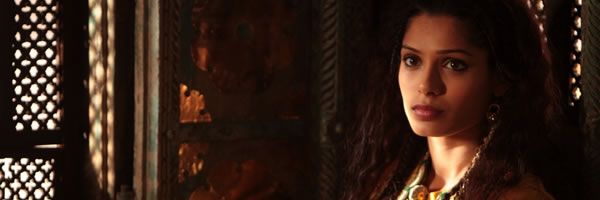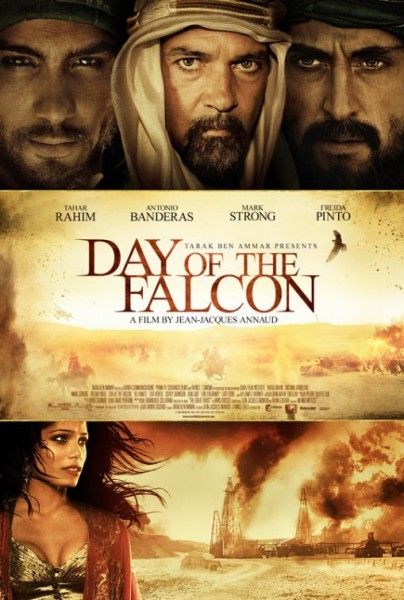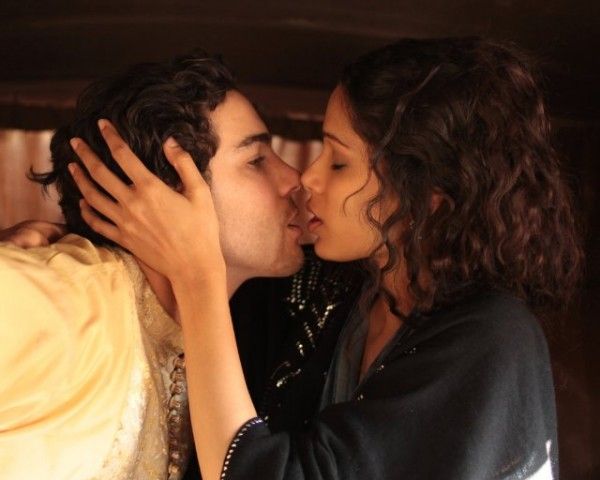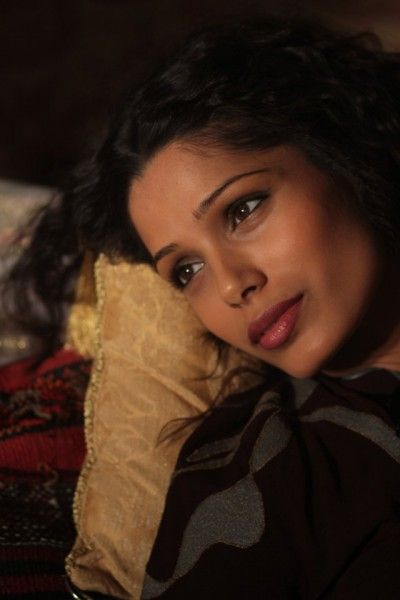From acclaimed director Jean-Jacques Annaud, Day of the Falcon is an epic story of honor, greed, betrayal and love, set in early 20th century Arabia. After years of bloody conflict, the leaders of two rivals kingdoms – Nesib, Emir of Hobeika (Antonio Banderas) and Amar, Sultan of Salmaah (Mark Strong) – reluctantly agree to end the fighting, only to have that war reignite when oil is discovered between their territories. Now it is up to their children, Princess Leyla (Freida Pinto) and Auda (Tahar Rahim), who are young lovers that married in hopes of bringing the families together, to find a way to end the violence and bring peace to the land.
During this recent exclusive interview with Collider, actress Freida Pinto talked about how she came to be a part of Day of the Falcon, the more than 20-year journey it took to bring the story to the big screen, what it means to her to be a part of such a special cinematic experience, her process for understanding her character, the incredible wardrobe and sets, and working with co-stars Antonio Banderas and Tahar Rahim. She also talked about her upcoming role in Desert Dancer, based on the inspirational true story of an Iranian dancer who risked his life for his dream despite a nationwide dancing ban, and the experience of working with director Terrence Malick on Knight of Cups. Check out what she had to say after the jump.
How did you come to be a part of this film? Was it something that you pursued, or did they come to you with this role?
FREIDA PINTO: I had done this film called Miral with Julian Schnabel that the producer, Tarak [Ben Ammar], was distributing in Italy. He already had this project and, if I’m not mistaken, he’d had the rights to the book for more than 20 years and wanted to make a movie out of it, and I think he’d already brought (director) Jean-Jacques Annaud on board. So, it basically happened with Miral. Miral premiered at the Venice Film Festival, and then I got a call from them.
When you’re a part of something that’s taken such a journey to get to the big screen, does it make you want to work that much harder to help fulfill the dream of the filmmakers?
PINTO: To be really honest, I had not known that it was that long that Tarak had the rights for the book. It was something that I learned much later on. But, when I saw the scale of the production itself, once I reached Tunisia where we shot the film, and saw the number of people that were working on the project, when your crew is that dedicated and has invested so much in it, you want to give it your all, as well.
What does it mean to you, to get to be a part of such a special cinematic experience, knowing that these locations are places that audiences rarely get to see and that these characters show a side of this culture that people aren’t largely familiar with?
PINTO: It’s a first for the Arab world to have a film on such a massive scale, and to make a beautiful and inspiration story into big commercial fare. It is big for the Arab world. All we could hope, with doing a film like this, was that it would encourage more investors to invest in stories from that part of the world, as well. French cinema is well represented. American cinema is well represented. British cinema is well represented. Indian cinema and Bollywood is well represented. So, why not give another part of the world that chance, as well? So, yeah, it always feels great to be at the start of something new. It’s almost like a revolution, in a way. This film definitely felt like that.
Was this a character that you were able to identity with, or did you have to do some research to understand the type of woman that she would be?
PINTO: I had to learn a bit about some of the stories because it is a girl very far removed from my reality. I’m not looking at the outside world through a window or a veil. For me, it is as free as free can be. For the character that I played, it was about trying to understand certain aspects of the culture that were not very familiar to me. Understanding that made it more fun because who wants to play themselves in film? You always want to embody a character and learn about them. It was very interesting for me to understand the culture before I actually got into the film.
Did it help transport you into this world, once you got into the wardrobe?
PINTO: Yeah, absolutely! I couldn’t have possibly gotten there with jeans on. It had to be with those elaborate vintage costumes. Leyla’s father (Antonio Banderas) is in a position where he could actually buy her expensive clothes from different parts of the world because he’s a wealthy king, so we used a lot of fabrics and vintage costumes from Paris. I don’t know if they got a lot from the Arab world, except for maybe fabrics, but ready costumes were mainly gotten from Paris and Italy. It was quite interesting to be dressed up in those old school costumes.
What was it like to be on these sets? Did it feel like you were in a different time period?
PINTO: Yeah! They built these amazing sets in Tunisia at Tarak’s studios there. That, itself, was a different part of the world for me. It was a place that I’d never visited. And then, as soon as we stepped onto set, there were horses and these massive buildings that were built for certain scenes, and everyone was in costume. That automatically makes you feel like you’re not part of what is today’s world, and that you’re back in the past. That really helps. Everyone was trying to bring a character to life and putting on an accent. It’s very easy to feel very removed from the present world, when you’re surrounded by that.
How was it to work with these actors, and tell both the relationship with Leyla’s father, played by Antonio Banderas, and the man that she loves, played by Tahar Rahim?
PINTO: For me, it was two very different worlds that I was playing with. With her father, it was this man who was really pompous and felt like he knew everything that needed to be known and was very arrogant. And then, on the other hand, I had Auda, who really was this wide-eyed boy that she eyed from the very beginning. She long for his affection and love, but he was this very intelligent and very shy boy who had not come into his own yet. Playing off of those two characters, I had to learn to maintain a certain level of strength between the two, to not be too dominated by the father or too dominant with Auda, while still holding a certain strength.
What do you have coming out next?
PINTO: I just finished a film that’s an Iranian story, but it was shot in Morocco. That’s called Desert Dancer, and that should be out sometime at the end of this year, once the editing is done. And I did a little film with Terrence Malick last year (called Knight of Cups).
What were those experiences like?
PINTO: With Desert Dancer, the experience was very different because it was a first-time director (Richard Raymond). I’m used to working with directors who have directed tons of films, relaxing into it and getting taken to wherever I need to be taken. But with this, I had to use all the training that I’d had on those other films and be as aware as possible. It was very interesting to collaborate with someone like that on a story that I found extremely inspirational. I spent almost a year of my life, training for that film. With Terrence Malick, you walk in there not knowing what to expect, and you get more than you could have ever wanted. It was just one of the most brilliant experiences. It’s like a spiritual awakening. You have to go in open-minded to a Terrence Malick film.
Day of the Falcon opens in theaters on March 1st.




